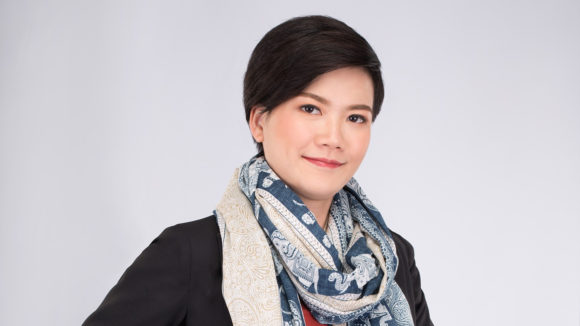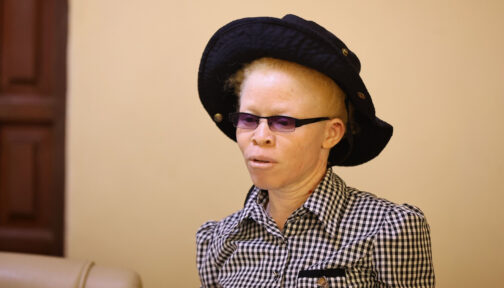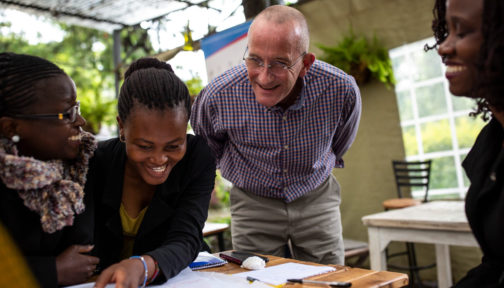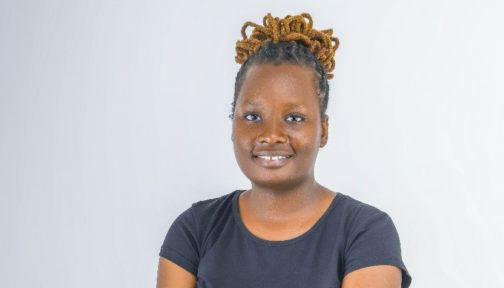Alex Nguyen is a programme manager at global technology and analytics company Ulula.
She leads the data team as well as on internal innovation programs, and designs practical tools to protect workers’ rights within global supply chains.
As part of the Global Labor Program – Inclusive Futures, Alex is designing a tool to share information with workers about their labour rights and enable them to raise complaints safely if these are violated. Here, Alex talks about what compelled her to focus her career on human rights and her hopes for the programme.
Alex’s story
“My background is in social sciences – I studied sociology at Birmingham University and a master’s degree in human rights law. I started my career as an intern at the South-East Asia regional Office of the UN High Commissioner for Human Rights (OHCHR) and later worked at the International Labour Organisation (ILO) regional office for Asia and the Pacific focussing on issues around forced labour, fair migration and non-discrimination at work.
“While I was at university, I had a part time job working as an interpreter translating from Vietnamese to English. This was in the 2000s, before the UK Modern Slavery Act was introduced and I learnt a lot about human rights issues and laws on forced labour and human trafficking.
“Through my role as an interpreter I worked with police officers, social workers and the civil service. I met lots of people with good intentions but who lacked the tools they needed to do the right thing. This is something that attracted me about Ulula – it focuses on offering practical tools to help businesses improve social, labour and human rights impacts in their supply chains.
“When the Rana Plaza garment factory building collapsed in Dhaka, Bangladesh in 2013, they found photos on workers’ phones of cracks in the building, which they had sent to their employers months before.”
Bridging the gap
“Ulula was set up to try and bridge the gap between workers’ voices and the powers that be. Through mobile phones, which are cheaply and widely available, it engages workers anonymously through surveys, grievance mechanisms and broadcast tools to monitor working conditions, gather feedback and provide information about their rights or health and safety. Suppliers and commercial brands use the data and insights we collect to identify risks in their supply chains and work together to find solutions.
“Our role within the Global Labor Program – Inclusive Futures is to design and test a broadcast tool which will share information with workers in Coca-Cola and East Africa Breweries Limited’s supply chains about their labour rights. It will also allow them to raise and solve grievances through two-way communication with expert case handlers and local capacity builders.
“By using online and offline channels on mobile phones like automated voice calls, web and messenger applications, our tools are designed to be accessible for all groups regardless of language, literacy level, location or disability.
“I was born in Vietnam and raised in the global south. I have an interest in developing solutions that empower local communities by making a long term, sustainable impact – without being dependent on continued funding. Through learning from previous work experience, I’ve come to appreciate the importance of upholding labour rights for groups with intersectional identities, such as women with disabilities.
“Interventions should be designed with inclusion in mind. The Global Labor Program – Inclusive Futures is a great example of how funding can help design and test innovative solutions. I believe the solutions we’re designing have the potential to be sustained by the Kenyan partners in the consortium and benefit the most disadvantaged groups.”
Local partners make a difference
“One thing that gets me really excited about the Global Labor Program – Inclusive Futures is the variety of consortium partners and the number of partners that are based locally in Kenya.
“The programme is bringing together all of these players – government partners, organisations of people with disabilities, women’s rights organisations and big companies like Coca-Cola and EABL – to try out ideas and test what works. I’m excited that the solutions will be owned by the Kenyan partners and they’ll be able to take them forwards and make them sustainable. I’m also hopeful that the solutions we develop could be adopted by other supply chains in and around the region.
“I’ve been working in human rights for a long time so for me it’s always been an important time to focus on workers’ rights. However, because of Rana Plaza and other manufacturing disasters, the reality of how workers are treated in global supply chains and the precarious conditions they work in has become impossible to hide.
“Workers’ rights are also more in the spotlight because of the political and economic climate. The Covid-19 pandemic in particular has made issues around workers’ rights more visible. It has forced us to re-evaluate who the essential workers in society are and whose work has value. The problems countries have faced around deliveries and product shortages have made the issues within supply chains more apparent and people are looking at them more.
“My experience is that most people want to do the right thing but they need to know how. I’m proud of working collaboratively with brands and businesses to find solutions and devise ways to implement their code of conduct.
“When I worked at the UN and ILO, businesses would come to us for support asking how they could improve workers’ rights while remaining competitive. I’m proud of working with people who want to make change and supporting them with the practical tools they need to make progress on social and human rights issues.
The importance of inclusive design
“The big thing I hope to see within the next 50 years or so is inclusive design. The book ‘Invisible Women’, by Caroline Criado Perez, explains how we design technology for a select group of people and expect everyone else to adapt. We should be designing our world to include everybody instead of designing things with the most advantaged group in mind and expecting everyone else to fit into that.
“Everyone should have equal access to the systems within their society. If we design our systems for the most disadvantaged, they will work for everybody else.
“For me, real innovation is where the people facing the problems that need to be addressed actively participate in designing the solutions, rather than the solutions being designed by people far away, with no lived experience of those issues.”



